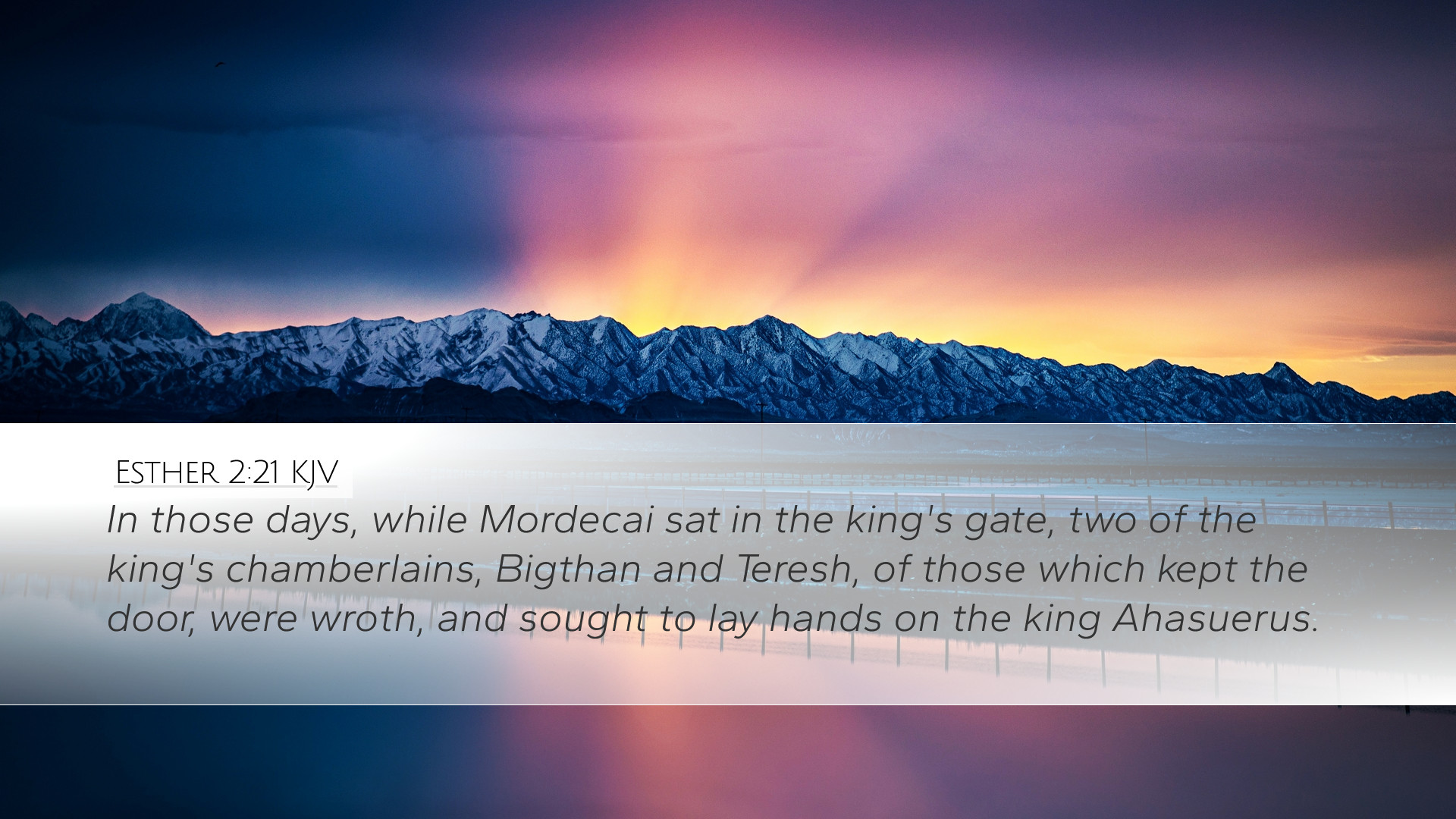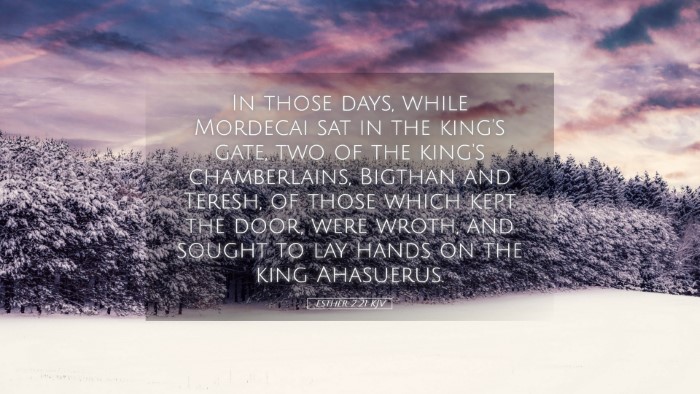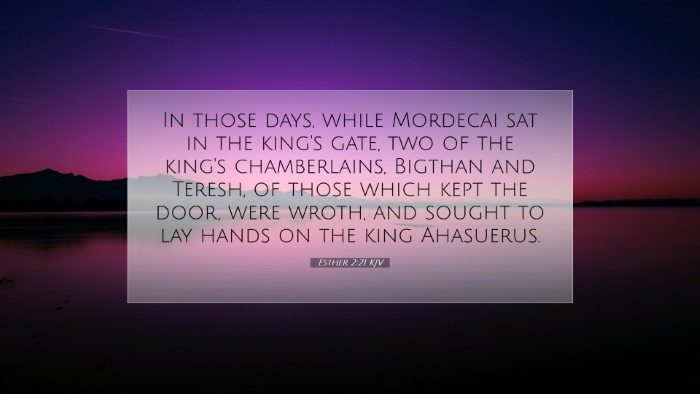Old Testament
Genesis Exodus Leviticus Numbers Deuteronomy Joshua Judges Ruth 1 Samuel 2 Samuel 1 Kings 2 Kings 1 Chronicles 2 Chronicles Ezra Nehemiah Esther Job Psalms Proverbs Ecclesiastes Song of Solomon Isaiah Jeremiah Lamentations Ezekiel Daniel Hosea Joel Amos Obadiah Jonah Micah Nahum Habakkuk Zephaniah Haggai Zechariah MalachiEsther 2:21
Esther 2:21 KJV
In those days, while Mordecai sat in the king's gate, two of the king's chamberlains, Bigthan and Teresh, of those which kept the door, were wroth, and sought to lay hands on the king Ahasuerus.
Esther 2:21 Bible Commentary
Commentary on Esther 2:21
Esther 2:21 states: "In those days, while Mordecai sat in the king’s gate, two of the king’s eunuchs, Bigthan and Teresh, of those who kept the door, became furious and sought to lay hands on King Ahasuerus."
Introduction
The Book of Esther presents a narrative that unfolds against the background of Jewish exile in Persia. Esther 2:21 serves as a critical juncture in the unfolding events that highlight divine providence, the complexities of human relationships, and the moral challenges faced by the characters involved. This commentary synthesizes insights from various public domain scholars such as Matthew Henry, Albert Barnes, and Adam Clarke to better understand the implications and lessons from this verse.
Contextual Overview
The events described in Esther occur during a tumultuous time for the Jewish people. After rejecting Queen Vashti, King Ahasuerus seeks a new queen, leading to Esther's elevation. Mordecai, Esther's cousin and guardian, plays a vital role in the narrative, often situated at the king’s gate. This position allows him insight into court affairs and the unfolding plots against the king, including the conspiracy of Bigthan and Teresh.
Mordecai's Role
Mordecai's position at the king’s gate is significant as it illustrates his vigilance and loyalty. According to Matthew Henry, his proximity to the rulers not only provided him with information but also positioned him to safeguard the king by being alert to any threats. This example showcases the importance of moral integrity and responsibility, especially in contexts of power.
- Responsibility: Henry emphasizes that those in positions of influence must act judiciously and ethically. Mordecai’s actions saved the king’s life and demonstrate the impact of individual choices on larger outcomes.
- Vigilance: The historical context of threats against kings highlights the need for watchfulness. Mordecai's alertness goes beyond mere curiosity; it reflects a commitment to justice and order.
The Plot Against the King
The conspiracy of Bigthan and Teresh, though motivated by anger, underscores the vulnerabilities of even the most powerful figures. Albert Barnes notes the irony that those closest to power were plotting against it. Their fury leading to treason is a cautionary tale about unchecked emotions and the consequences of betrayal.
- Human Nature: The text exposes the fragility of human relationships within power dynamics. It serves as a reminder of the potential for greed and ambition to corrupt those who serve in close quarters.
- Divine Providence: Barnes further suggests that the revealing of this plot illustrates how God orchestrates events in ways that protect and advance His plans, even through the actions of flawed individuals.
The Character of Bigthan and Teresh
The characters of Bigthan and Teresh are archetypes of scheming and disloyalty. Adam Clarke explores their motivations and how their resentment transformed into an attempt on the king's life. Their conspiring reflects deeper themes of jealousy and ambition that can poison relationships.
- Consequences of Anger: Clarke emphasizes that their fury was not a righteous response but rather an example of how personal grievances can lead to destructive actions.
- The Fallibility of Authority: The incident implicitly highlights that even those in authority can be targets of betrayal, reinforcing the idea that vigilance and discernment are essential in governance.
Divine Timing and Influence
As the story continues to unfold, it becomes evident that Mordecai’s discovery of this plot is not merely coincidental but part of a divinely orchestrated plan. Each event, no matter how trivial it may seem, contributes to the larger narrative of salvation and identity for the Jewish people.
Mordecai’s Actions: By reporting the conspiracy, Mordecai plays a pivotal role not only in preserving the life of the king but also in setting the stage for Esther's eventual rise and the subsequent deliverance of the Jews. This manifold purpose reflects the theme of God’s sovereignty throughout the Book of Esther.
Lessons for Today
The events surrounding Esther 2:21 offer several valuable lessons for pastors, theologians, and students of the Bible:
- Importance of Integrity: The example of Mordecai shows that integrity in one’s role, whether in secular or sacred spaces, is paramount. The faithful steward must act with both courage and wisdom.
- Understanding Divine Providence: Just as God worked through Mordecai's actions to achieve a greater plan, believers must trust in God's providence, recognizing that He uses various circumstances for His purposes.
- Impact of Individual Choices: Each person’s actions can ripple outward, affecting many others. The consequences of Bigthan and Teresh's plot remind us to be mindful of our ambitions and how they align with moral righteousness.
- Value of Vigilance: Being vigilant in prayer and action in one's ministry can prevent evil and promote justice, echoing the call for righteous living in accordance with God's will.
Conclusion
Esther 2:21 encapsulates themes of loyalty, betrayal, divine intervention, and moral integrity. The insights provided by commentators such as Henry, Barnes, and Clarke encourage a deeper understanding of this pivotal moment in the narrative. By reflecting on these lessons, readers and leaders can draw practical applications for their lives and ministries, recognizing the continued relevance of these ancient texts.


